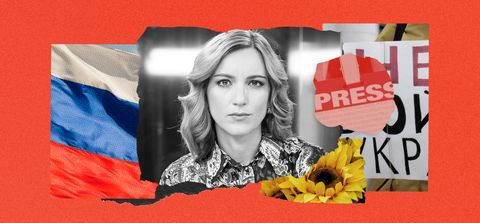Censored, Shut Down, and Forced to Flee
- vybrancz

- Mar 19, 2022
- 2 min read
Censored, Shut Down, and Forced to Flee

After tucking her two little boys into bed, crusading Russian journalist Ekaterina Kotrikadze waited anxiously at their Moscow home for her husband to return from work. “I was fully expecting that he would be arrested in front of the building where we lived,” Kotrikadze tells ELLE. If they got him, they would surely come for her—and if that happened, there was a good chance she’d never see her children again. Just hours earlier, the Russian government had announced plans to reportedly retaliate against independent media outlets for referring to the brutal war in Ukraine as a “war,” or the invasion as an “invasion.” Kotrikadze, 37, and her husband were both helping run TV Rain, the last independent news network in Russia. Their channel’s dogged determination to report the truth in defiance of Russian President Vladimir Putin and the Kremlin meant they now had targets on their backs.
On March 2, Kotrikadze decided they couldn’t just sit and wait for the worst to come. She packed up only the essentials, escaping with her family just in time: Two days later, Putin signed a so-called “fake news” law effectively criminalizing anyone who spreads what the government decides is misinformation about the war against Ukraine. The punishment is up to 15 years in prison. Like many other independent journalists in Russia, Kotrikadze was forced to weigh her job against the safety of her loved ones. Today, she shudders to think about what would have happened had she stayed. “We would have been declared something like extremists... maybe an enemy of the state or enemy of the people,” she says. “They were trying to do everything they could to punish us for being journalists in this country.”
After scrambling for flights out of Moscow, Kotrikadze and her family stayed with friends in Istanbul for a few days, before going to Tbilisi, Georgia, where at least 20,000 other Russians have already arrived since last month. The sad irony of being in Tbilisi is not lost on Kotrikadze: She was back in the same country where, as a little girl, she had escaped other, earlier horrors of war. Kotrikadze is talking to me via WhatsApp from the same room in her grandfather’s apartment where she lived into the early ’90s. Back then, at the height of the Georgian Civil War, the place had no gas, no electricity—and certainly no television. Every evening, a young Kotrikadze would gather her family in the living room and “report” the news of the beleaguered region. She wrote out cue cards, and drew pictures to act as “footage.” Even then, she felt a calling. “I never had any doubts that I needed to be a journalist,” she remembers.
Original post: https://www.elle.com/culture/career-politics/a39429919/russia-journalist-tv-rain-ekaterina-kotrikadz






Comments